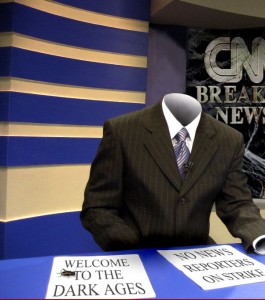Parsing literacy
Very likely you’ve heard or read online some of the stories in NCPR’s ongoing  series on literacy, including collaborative work with WBEZ in Chicago.
series on literacy, including collaborative work with WBEZ in Chicago.
There are all kinds of literacy: reading, cultural, political, scientific. Our Vermont friend, Bill Schubart, writes a blog on a variety of timely topics. His latest blog entry, originally a VPR commentary, addresses media literacy.
Bill’s essay touches on a topic many of us talk about all the time: how Americans, of all ages, distinguish or fail to distinguish between journalism and entertainment or infotainment. Here’s my question: Does it matter? Weigh in below.
(The essay below is by Bill Schubart and is copyrighted to Magic Hill LLC and is used here by permission of the author. You can contact Bill directly or find out about his blog at: [email protected])
Media Literacy: News or opinion
In our much vaunted Information Age where journalism, opinion, advocacy and entertainment are often heard simply as “news,” our inability to differentiate between them is certain to feed the political chaos enveloping our country and further endangers our democracy.
I first heard the term “media literacy” in 1962 as a senior at Phillips Exeter in New Hampshire. I was president of the Literary Club when Exeter came under furious editorial attack by the publisher of the Manchester Union Leader, William Loeb. Loeb was famous for ignoring journalistic tradition and running his personal opinion pieces in the news section of his paper’s front page. At the time, Loeb also owned the St. Albans Messenger and the Vermont Sunday News.
My American history professor at Exeter was a renowned historian named Henry Bragdon. He had just co-authored, The History of a Free People, which was adopted widely as a text in schools. This infuriated William Loeb, who came to see Exeter as a hotbed of Communism.
Bragdon’s publisher inadvertently fanned the flames by publishing the first edition with a red cover, which to Loeb only verified its Communist origins. Another leftist indicator was its use of the word “genocide” to describe government policy towards Native Americans.
On the front pages of New Hampshire’s largest newspaper, Exeter became, “That Little Red Schoolhouse in Exeter,” and by inference, I became a member of the Comintern.
My response was to invite Loeb to Exeter for a dialogue. I was ignored. Loeb apparently had little tolerance for dialogue, less for dissent. A decade later, a book critical of Loeb exposed his efforts to hide his Jewish background, expunge the record of an earlier marriage, and fabricate experience as a Hearst journalist.The mash-up we now call “news” imperils our democracy. Information needs to be vetted by skilled editors and fact-checkers to ensure that it is accurate, unbiased and verifiable. Too often I hear otherwise intelligent adults earnestly reciting opinion as news. Kids often say they get their news from Comedy Central or Saturday Night Live.
News by its nature must be selective and that is often seen as biased, but responsible reporting on any topic must be derivative of fact, not opinion. Conservatives claim the NY Times is liberal and liberals claim that the Wall Street Journal is conservative, yet both still invest to some degree in ensuring that news is more or less news. Most, bias judgments usually derive from a paper’s editorial stance.
But now, the likes of Walter Cronkite and A.J. Liebling have been replaced by Rush Limbaugh, Rachel Maddow and Bill Maher, all bringing us opinion and entertainment that we hear as news.
To be educated and to be citizens in a democracy, young people must be media-literate. We need to integrate media literacy into our schools so our children can differentiate between fact-based journalism, someone’s opinion, marketing and satire. If they can’t, their votes will be ill-informed and we will put our democracy even further at risk.
Tags: bill schubart, journalism, literacy








“News by its nature must be selective and that is often seen as biased, but responsible reporting on any topic must be derivative of fact, not opinion.”
An interesting laudable definition; however, not likely a creative task attainable by many if any humans on planet Earth. It has been my observation of human nature that virtually 100% of us view “everything” through prejudicial eyes. Some of us are able to argue our convictions from both sides so as to appear unprejudiced and some are capable of being convinced by argued opinions opposed to ours.
If the above definition of news were exclusively enforced, scientific papers would likely become the most sought after front page “news” stories, which might please a few of us; however, I would expect the consumption of news to fall orders of magnitude more rapidly than it is currently falling. As the authors of “news” reports are,”usually”, human I can conceive of no rational reason to think that the evolutionary processes which resulted in our prejudiced brains did not similarly prejudice theirs.
Human prejudice undoubtedly influences selection of, subliminal bias of and facts containing subsumed opinions of, “news” reporting.
The only problem I see with Bill Schubart’s story is that he argues against opinion and then does it.
To the extent there is a problem, and I agree there is a problem, I believe it can only be corrected at the high school and college level. Students need to be taught how to be discriminating readers and listeners of news.
Basic rule of thumb: throw up the red flags whenever you see adjectives and adverbs used in a “news story.” They are almost always indicative of an opinion at best and at worst are an attempt to slant the view.
No, Virginia, a red flag is not a covert commie expression.